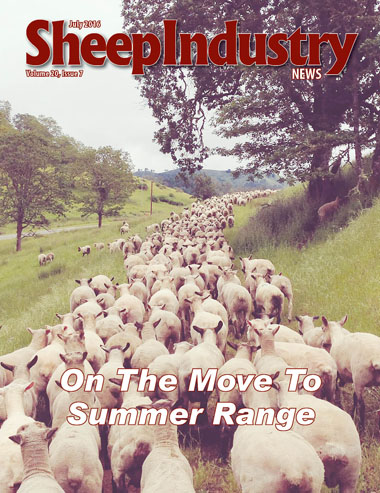
- July 2016
- President’s Notes
- Yellowstone Menus Offer Lamb
- ASI Comments on Behalf of USSES
- ASI Photo Contest
- Industry Recommends Research Priorities
- Sheep Center Sets Grant Deadline
- Sale Strengthens Lempriere
- Appropriations Update from Washington, D.C.
- Guaranteed for Life
- Young Entrepreneur: Sarah Spear
- CSU Vet Team Works Wyoming Ranch
- NSIP Offers Producers Online Tools
- Obituary
- Market Report
- Around the States
- The Last Word
Industry Recommends Research Priorities
On May 19, ASI participated in a sheep research listening session with the U.S. Department of Agriculture’s Agricultural Research Service and National Institute of Food and Agriculture to communicate top challenges and potential research and education priorities for the upcoming planning cycle.
In a follow-up letter to Bret Taylor, Ph.D., animal scientist at the U.S. Sheep Experiment Station, ASI President Burton Pfliger (N.D.) reiterated sheep producer’s interest and support of science-based solutions to their production challenges and stressed its appreciation of ARS’s investment in sheep research, the high-quality science that results from this investment and especially the dedicated scientists and other personnel who turn challenges into ideas and solutions.
ASI commissioned a comprehensive study that was designed to determine the national research, education and development priorities for the U.S. sheep industry. The findings are reflective of those identified by the National Research Council in its 2015 report on the role of animal science research in food security and sustainability. The following NRC report quote summarizes the value of investing in animal science research:
“Productivity is a key element in achieving food security, and production efficiency relates to sustainability through its effects on economics and environmental impacts. Increasing the productivity per animal unit and land unit while concomitantly decreasing negative impacts on the environment (sustainable intensification) can ultimately produce safe, affordable and nutritious food to help meet overall global food and protein needs. Technological advancements, genetic improvement, better nutrition, husbandry and advances in animal health and welfare in animal production have contributed to major productivity and efficiency gains in food animals.”
One of the major recommendations in the NRC report is: “Research should continue to identify alternative feed ingredients that are inedible to humans and will notably reduce the cost of animal protein production while improving the environmental footprint.” It has been demonstrated and observed that sheep are very useful in accomplishing this goal and it is but one example of how sheep research and education opportunities can contribute toward more efficient food and fiber production while also serving the public good in terms of environmental sustainability in various ecosystems with multiple wildlife interactions.
ASI provided a comprehensive list of its findings with regard to research and education and stands ready to assist USDA to advance science and help the sheep industry deliver high quality consumer products in an environmentally sustainable manner.

